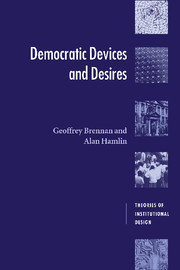9 - Political representation
Published online by Cambridge University Press: 22 September 2009
Summary
The effect of [representation] is, on the one hand, to refine and enlarge the public views, by passing them through the medium of a chosen body of citizens, whose wisdom may best discern the true interest of their country, and whose patriotism and love of justice will be least likely to sacrifice it to temporary or partial considerations. Under such a regulation, it may well happen that the public voice, pronounced by the representatives of the people, will be more consonant to the public good than if pronounced by the people themselves, convened for the purpose. On the other hand, the effect may be inverted. Men of factious tempers, of local prejudices, or of sinister designs, may, by intrigue, by corruption, or by other means, first obtain the suffrages, and then betray the interests, of the people.
(Federalist papers, 10, James Madison)Representation and political agency
Ideas of representation in political theory are notoriously diffuse and recalcitrant. We shall not here be concerned with the full array of these ideas. Our attention in this chapter will be focused on the issue of political agency – on the simple fact of representation, rather than its detailed form. The essential feature of representation, as we shall understand it, is that a mediating assembly of some kind is set between the citizenry and political decision making.
- Type
- Chapter
- Information
- Democratic Devices and Desires , pp. 156 - 184Publisher: Cambridge University PressPrint publication year: 2000

